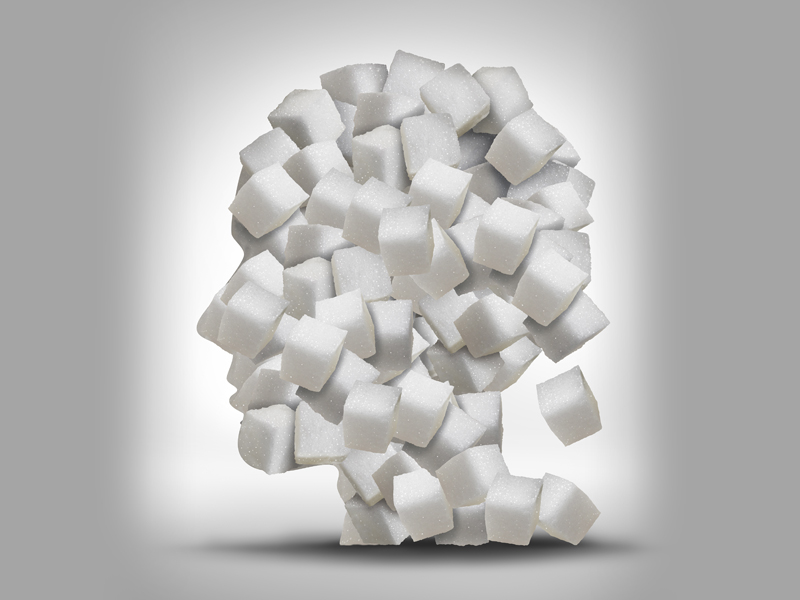Get Easy Health Digest™ in your inbox and don’t miss a thing when you subscribe today. Plus, get the free bonus report, Mother Nature’s Tips, Tricks and Remedies for Cholesterol, Blood Pressure & Blood Sugar as my way of saying welcome to the community!
Why sugar today could mean Alzheimer’s tomorrow

Inflammation is a killer.
Science and medicine have established the fact that inflammation is the problem behind all the diseases and conditions that scare us. Here’s what I mean…
Chronic inflammation causes DNA changes that lead to cancer. As an example, people with chronic inflammatory diseases like irritable bowel disease have an increased risk of colon cancer.
Smoking, poor diet, stress and other factors cause oxidative stress. Damaged blood vessels lead to stroke and heart attack.
The oxidative stress and inflammation resulting from over-consumption of carbs and sugars can lead to diabetes.
And, in recent years, scientists from several countries have established a firm connection between inflammation and the development and severity of Alzheimer’s disease.
How the brain’s immune system can cause harm
Macrophages are the body’s security guards. These white blood cells are always looking for infection, injury and damage. When any of these occur, macrophages travel to the site through the bloodstream and cause inflammation.
Microglia are the brain’s specialized macrophages. They recognize the amyloid plaque of Alzheimer’s as an unwanted substance and attack it as they would an infection. The problem is that amyloid plaque is persistent and does not clear out immediately.
Thus begins the standoff between microglia and plaque.
Inflammatory cells called cytokines are produced. They cause oxidative stress and harm healthy brain tissue. The enzyme BACE1 may increase. BACE1 is thought to stimulate more amyloid production while weakening the microglia’s ability to eliminate it.
New research: microglia have memories
Research has already shown that infectious disease and inflammation early in life can affect the severity of Alzheimer’s later on. But how does this occur?
A group of German researchers worked with mice to answer this question. They wondered if microglia actually ‘remember’ those early risks and communicate them to the brain later in life.
The answer was yes. Even many months after they had induced bodily inflammation in the mice, the microglia showed genetic changes that were linked with their ability to remove amyloid plaques.
What does this mean for you? Simply this: the longer you allow inflammation to continue, the more your brain is damaged and at risk for Alzheimer’s.
The sooner you control inflammation, the better
How do you get a grip on inflammation and reduce your Alzheimer’s risk?
Eat an inflammation-fighting diet. There’s no better way to keep inflammation under control than with the foods you eat (and the ones you don’t eat!).
The bad guys:
- You’ve heard this one over and over, but it bears repeating: Sugar puts a strain on your body. If you need a review, here is a comprehensive list of the damage it does.
- Diet sodas. This is not a healthy substitute! A can of diet soda a day causes brain shrinkage and triples your risk of stroke and dementia.
- Fast food. The research is clear: fast food destroys your brain.
The good guys:
- Omega 3 fatty acids. These healthy fats actually protect your brain. Salmon, sardines or fish oil supplements are great sources.
- Fruits and vegetables. Phytonutrients in plant foods are high in antioxidants. Richly colored foods like blueberries, broccoli, tomatoes, squash, yams and strawberries are great sources. So are dark chocolate and avocados.
- Whether consumed in yogurt and other fermented foods or via supplements, probiotics are another natural way to control inflammation.
- Other minerals and supplements. Turmeric, curcumin, Vitamins A, C, D and E and magnesium all carry antioxidant power. They are all readily available through a healthy, balanced diet, as well as in supplement form.
- Modified citrus pectin. Derived from citrus fruit peels, this powerful detoxifying supplement fights rogue molecules that cause inflammation. It can protect you from a host of chronic illnesses.
De-stress. A little stress is good, and certainly unavoidable. But unrelenting, high-level stress causes inflammation. Finding ways to de-stress can save you from Alzheimer’s. Mediation, yoga, or just setting some time aside for deep breathing and being in nature can have a tremendous positive effect.
Exercise. Just 20 minutes of moderate exercise per day helps control inflammation. Take a short walk or practice tai chi. Even gardening or cleaning qualify!
Editor’s note: While you’re doing all the right things to protect your brain as you age, make sure you don’t make the mistake 38 million Americans do every day — by taking a drug that robs them of an essential brain nutrient! Click here to discover the truth about the Cholesterol Super-Brain!
Sources:
- Immunological Memory in the Brain — NeuroscienceNews.com
- A New Angle on Alzheimer’s Disease: The Inflammation Connection — BrightFocus Foundation
- A New Look at Brain Inflammation in Alzheimer’s — The Dana Foundation













